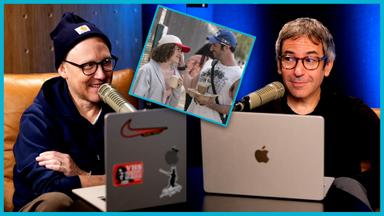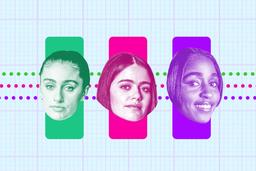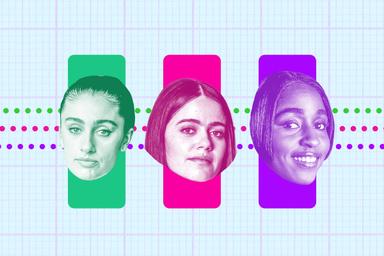I saw a clip the other day—on TikTok, obviously—asking where the voice of Gen Z, the Lena Dunham for this new generation of hapless 20-somethings, might be hiding. The creator of the video fought some battles in the comments, as is the way on that godforsaken clock app: Those suggesting Ivy Wolk or Audrey Hobert were wrong, she said, because the voice of a generation should speak on TV.
But could the voice of Gen Z find its true home on TV, a slow-moving, almost 100-year-old medium guarded by decidedly non–Gen Z gatekeepers? There’s already a cacophony of Gen Z voices shaping more freewheeling dialogues on TikTok and X and, yes, Instagram Reels, where they can be righteously indignant, self-consciously performative, openly confessional, censorious, cruel, absurdist, or just young, dumb, and fun on their own terms. Can TV be the platform for the voice of this generation at all?
HBO, former home of Dunham herself, is betting that it can be, plucking Rachel Sennott out of the untamed frontiers of the internet, queer cinema, and Charli XCX music videos to run her very own TV show, I Love LA. The show joins Prime Video’s Overcompensating and Hulu’s Adults as the latest attempt to give a voice to Gen Z on TV (or, at least, create a voice that can plausibly sound like Gen Z’s, even if it’s a touch older). Sennott herself isn’t technically a Gen Zer; she was born in 1995, making her, in her own words, a “zillennial.” But the consensus at HBO—as well as in the comments section of that TikTok—seems to be that there’s no better voice to speak for Gen Z (on TV) than hers. If the network has to compete with social media for the attention of America’s youth, why not go straight to the source, anointing someone who speaks internet fluently instead of parroting years-old memes, sounding like a 35-year-old trying to relate to their fellow kids, or descending into out-of-touch nonsense? As Sennott herself has said, “The internet is in our bones, and I wanted to have it exist in the show in the way it does in real life.”
Like anyone who’s made their living, in large part, from their online presence, Sennott has a distinct personal brand: On her (now defunct) Twitter, she was horny and brazen, loudly, proudly declaiming about the size of her tits and her debased and joyous sexual exploits. She was so hot that it scared you a little but also made you laugh (and think!)—after all, this was someone who said, “What the haters and also my mom don’t seem to understand is that when I post a photo of my bare tits there are at least 3 layers of irony.” Sennott’s since described her Twitter persona as a manic, heightened version of herself, but it was real enough to define her and make her an internet it girl: an avatar for Gen Z’s arch, above-it sensibility, just barely masking a bleeding insecurity.
In parallel with Sennott’s online rise was her come-up in movies, where she’s always manifested the kind of star power that convinces HBO to build a show around you. Her big break—where most people saw her for the first time, unless they were chronically online and/or a fellow NYU student at one of her stand-up shows—was 2020’s Shiva Baby, expanded from a short film she originally made with another NYU alum, Emma Seligman. As Danielle, shiva sitter and sugar baby, Sennott projects a sense of jangly anxiety as she avoids her sugar daddy, her ex-girlfriend, her helicopter parents, and every overbearing woman commenting on her weight at a claustrophobic shiva. Danielle was the Rachel Sennott paradigm: a character both in touch with and out of control of her sexuality, channeling it for ends she can’t predict, making you laugh and cringe at the same time. In Bodies Bodies Bodies, Sennott was maybe even funnier, unapologetically self-absorbed in the face of any and all traumas, obsessed with astrology and reading her victims to filth. Bottoms was her follow-up collab with Seligman; it upped the ante and the antics of Shiva Baby, and it was Sennott’s first foray into (co)writing a movie. She was the “joke factory,” while Seligman crafted the bloody plot for the lesbian fight club movie and worked with Sennott to turn her harebrained bits into a good story.
When Sennott got a meeting with HBO about a potential TV project, she came locked and loaded with a few high-concept ideas for a pilot, one of which was based on a short she’d made about a girl who talks to ATMs. HBO’s enthusiasm was low. What the network wanted was to get to know her, Twitter’s own treaclychild, and she obliged, opening up about her Saturn return and the messes and distresses she’d been joking about on Twitter for years. Not long after the meeting, Sennott learned that HBO wanted to proceed with developing a show with her—not about ATMs but about all the material mined from her own life. The series, fittingly, would become “The Untitled Rachel Sennott Project,” centered on its star and showrunner’s anxieties and experiences—because, like its HBO forebears Sex and the City or Girls or Insecure or even Entourage (which Sennott has name-dropped as one of I Love LA’s closest relatives), it wasn’t sold on surreal comic high jinks, but on the person and voice it was built around.
I do have to admit that the persona-centric approach—and the length of time the show was referred to as just “The Untitled Rachel Sennott Project”—had me worried about I Love LA before I got the chance to see it. I’d been charmed by Sennott like everyone else on the internet, but I always got the impression that she was a little one-note. When I imagined her, I saw her downturned bedroom eyes in a post about her tits and ass or heard “Your parents are upper … middle … class” on a loop. She’s bratty, she’s clever, she’s a little troubled, but I wasn’t sure what it would look like when she turned Twitter punch lines into a bigger story or wrote a character who wasn’t just an insecure hot girl. Like anyone on the internet, her most marketable commodity was herself, and she’d turned that brand into a living and a TV show—but I was curious about whether it would be a compelling story for a bigger audience.
HBO might have had similar concerns, because it paired Sennott with a co-showrunner, Emma Barrie, who’d previously worked on Barry and had more experience in professional writers rooms—but also had a sensibility similar to Sennott’s. As in her collaborations with Seligman, Sennott worked with Barrie and the show’s other writers on crafting a narrative and writing for characters beyond just herself; even if it was “The Untitled Rachel Sennott Project,” it didn’t spring fully formed from her mind alone.
I do think the show, at least at first, is maybe too hyper-focused on making the obvious jokes about life in L.A. (the driving! the nepo babies! the earthquakes! the influencers! Erewhon’s expensive!) and getting every Instagram-friendly East Side reference right; at times, it feels like I’m watching an influencer reel off recommendations for vibey restaurants in Los Feliz. But what’s promising about the series so far is Sennott’s approach to packaging her persona, which is what got I Love LA off the ground in the first place. Sennott’s taken her identity and split it into two distinct, defined characters: the anxious, ambitious Maia (Sennott herself) and the uninhibited partygoer-cum-influencer Tallulah (Odessa A’zion). Tallulah’s what Sennott appears to be when she’s posting from Charli XCX’s wedding or drinking martinis with Molly Gordon: well-connected, effortless, a little raunchy. Maia, on the other hand, is more like what Sennott herself probably feels like in the day-to-day: a little neurotic, unsure of herself, hardworking but with no clear idea of where it’ll get her. They’re two sides of the Gen Z economy, where, “like, 89 percent of kindergartners want to be a TikTok influencer” (the other 11 percent apparently wants to manage influencers), but they’re also two sides of Sennott herself: “In a way, Tallulah almost represents me when I was younger, me when I lived in New York, and Maia is sort of like me where I was a couple years ago, which is like the most anxious, control-freaky [person].”
It’s a smart way for Sennott to approach I Love LA. Tallulah gets to be that glamorous and raw version of Sennott that we all know and want to vicariously live through. A’zion is almost unnervingly convincing as an always-on influencer who sucks up all the air in the room but keeps you mightily entertained while she’s fucking up your plans. Maia, meanwhile, gets to be the side of Sennott that isn’t on such public display, the antisocial, self-loathing gremlin creeping underneath the surface. Tallulah’s the promise of Sennott; Maia might be closer to the reality.
By splitting herself in two, Sennott also connects the show to the TV predecessors that paved the way for her. Maia’s a lot like Hannah Horvath, Issa Dee, and Carrie Bradshaw, the flawed, relatable, striving heroines at the center of Girls, Insecure, and Sex and the City, respectively. And like those protagonists, she’s surrounded by friends who are more successful or freer or funnier or more confident than she is—foils for the lead’s ambitions and pursuit of whatever she feels like she’s missing: a good job, a boyfriend, a bigger apartment, or just the purpose that she’s been told is out there waiting for her. There’s always a cosmic balance between ribaldry and practicality, chaos and order on these shows, and it wouldn’t be a good story if either Tallulah or Maia were missing. (In other words, the world needs both Geminis and Virgos to go round.)
All of these series are asking different questions and dealing with different realities but working in the same kind of sandbox. With I Love LA, Sennott has said she wants to show what life’s like for Gen Z after COVID, labor strikes, and the introduction of the influencer economy—the specific difficulty now of getting a job and “making it” while visions of other people’s success parade across your screen, painting places like L.A. and New York as a playground, even though they can be a nightmare for someone like Maia. She wants to show influencer culture like it actually is for the people living it, without condescension, which hasn’t been done (well) yet on TV. And I’m interested in what someone as sharp as Sennott has to say about what content creators and Hollywood nepo babies are up to right now, even if the show’s a little familiar and leans a little too hard on the same old setups and jokes.
It’s still early, but I Love LA is showing glimmers of what it truly wants to dissect: the conflict between a real personality and an online one, the real work that goes into looking effortless, and the divide between people (like Maia’s boyfriend, played by Josh Hutcherson) who live their lives in the “real world” and the people who base theirs on what’s happening on the internet. These things have been reflected on plenty online, but there’s still something worthwhile in crafting a story out of them and packaging them in something other than the navel-gazing, short-form soliloquies that take up all the space on TikTok. As much as I love it there, there’s still value in telling a richer, more complicated, and hopefully more rewarding story for television. What’s old can always be new again, as long as there’s something left for a voice of a generation to say.




